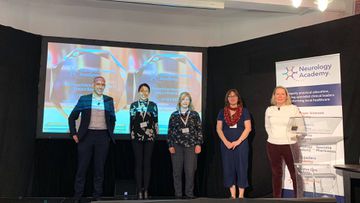Trusted advice, support and information: harnessing the best bits of social media
Knowledge
Ciara O'Meara, a college lecturer at the National University of Ireland Galway (NUIG) wrote this statement in her intermodule project within the MS Foundation MasterClass in 2021 in her previous role as a clinical research nurse. She developed a social media-directed resource tool for newly diagnosed patients whilst she was based at University Hospital Galway, with the aim of minimising and discouraging the use of 'Google' searches and to support MS Clinical Nurse Specialists with information and resource provision.
We interviewed her to find out more about her motives for developing the tool, its impact locally on both people with MS and staff supporting them, and her hopes for the future.
A unique perspective
Ciara is in a unique position as a clinical research nurse as she also lives with MS herself, and it was her experience of both being a newly diagnosed patient, and being a healthcare professional which led her to develop this project. She discussed her diagnosis 12 years ago when social media was in its infancy and much of the resources available felt aimed at people older, or further along in their journey with MS, than she was.
Ciara talks about her positive relationship with social media as a support in her own journey with MS, particularly things like the Shift.MS buddy system and MSTogether, and how she pondered the best way to raise awareness of these spaces which can be reservoirs of connectivity and information, to people with MS who are recently diagnosed.
Developed collaboratively
Ciara developed her simple tool in collaboration with a variety of different people from different walks of life, and living across the globe, but all living with MS.
In liaising with other people living with MS via social media, Ciara developed her simple tool, a visually appealing list of trusted websites and social media channels for people with MS to get information and support. It was feedback from individuals which led to the order that the sites appear in the tool.
Ciara was also surprised to find that this tool had a significant use beyond those who are newly diagnosed with MS.
Talking to her local MS nurse about the tool, she discovered that there were resources being signposted towards that the nurses were unaware of too, things like the MS Trusts' series of videos, and MSTogether as a trusted form of social media for people with MS.
Practical use
Ciara's current role is in lecturing rather than clinical practice, so she has needed to be creative about how to utilise her tool since completing the project last December.
She has shared it widely in an informal capacity through the social media channels she used to develop it, and has heard from individuals who contributed that they are sharing it informally too, taking advantage of the mass network that social media provides.
She also guest blogs for the MS Society of Ireland, and her next blog will be highlighting the tool on their website.
Regarding use of the tool in clinical practice, Ciara has been talking to her own MS nurses about what this could look like.
She has also been discussing the best timing of giving the tool out to someone who i newly diagnosed. She is very aware that a space of a few weeks might be needed to process the diagnosis before someone is ready to seek information whilst leaving it too long could lead to an unhelpful Google episode.
In the meantime, Ciara is keen for the tool to be as useful as possible, for healthcare professionals to draw on the information so that they can signpost confidently, or to be used directly as a tool to share with patients in clinic, via support groups, or elsewhere.
Ciara has given permission to share a pdf of the tool, to be used by healthcare professionals or accessed directly by people affected by MS:
Find out more about Ciara's project: Navigating MS Through The World of Social Media: Steering Away From Dr. Google
Related articles
Encouraging excellence, developing leaders, inspiring change
MS Academy was established in 2016 and in that time has accomplished a huge amount with exciting feedback demonstrating delegates feel inspired and energised along their personal and service development journeys. The various different levels of specialist MS training we offer are dedicated to case-based learning and practical application of cutting edge research.


